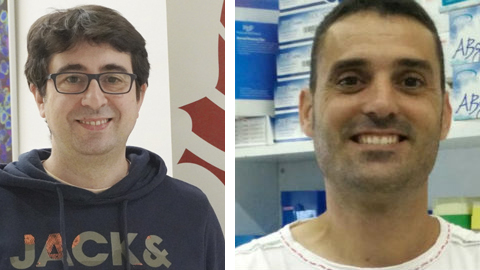A rapid test detecting bacterial resistance and a therapeutic strategy to treat inflammation of injuries affecting the central nervous system and neurodegenerative diseases, led respectively by researchers Albert Quintana and Rubèn López Vales, are two of the five initiatives receiving support from the Barcelona Deep Tech Node to boost innovation and help their technology reach the market.

Two of the five "Proof of Concept" projects granted by the Barcelona Deep Tech Node belong to research groups from the UAB. The selected projects, ResisChip and Neuroresolution, will receive support to obtain funding, accelerate their technological development, and shorten the time until they enter the market. In addition, these proofs of concept will make it possible to guide other crucial aspects of the projects, such as carrying out market studies, the formalization of patents, or presentations to investment forums.
Detect bacterial resistance with a rapid test
The ResisChip project aims to develop a new technology for the rapid and accurate detection of bacterial resistance at an affordable cost. Antibiotics have had a huge impact on health and society, but misuse and overuse have led to a continuous increase in antibiotic-resistant bacteria. ResisChip proposes a new detection method that combines a ribonucleic acid chip with high sensitivity and rapid detection with a patented antibody, which allows identifying thousands of bacterial species and resistance genes from clinical samples.
The project is led by researcher Albert Quintana and his team from the Department of Cell Biology, Physiology and Immunology, and the Institut de Neurociències (INc-UAB), with the collaboration of the Parc Taulí Research and Innovation Institute.
New treatment for inflammation
The Neuroresolution project aims to develop a new therapeutic strategy to treat trauma affecting the central nervous system and degenerative diseases. Inflammation is a response of the immune system to infections or injuries that, in some cases, can become chronic and cause degenerative diseases of the central nervous system. Therefore, to avoid the side effects of anti-inflammatory drugs, there is a need to develop new therapies. This project proposes a new approach to the treatment of acute spinal cord injury (SCI), multiple sclerosis (MS), and amyotrophic lateral sclerosis (ALS), based on the administration of maresins, lipid mediators that stimulate natural programs that lead to the resolution of inflammation.
Researcher Rubèn López Vales of the Neuroplasticity and Regeneration group at the Department of Cell Biology, Physiology and Immunology, INc-UAB, is studying how to develop a neuroresolving therapy for injuries and diseases of the central nervous system.
Barcelona Deep Tech Node is an alliance to promote technological and innovative projects made up of the Barcelona City Council, through Barcelona Activa, the University of Barcelona, the Universitat Autònoma de Barcelona, the Polytechnic University of Catalonia, the Pompeu Fabra University, and the Open University of Catalonia. Since the launch of the initiative, a hundred projects and spin-offs from universities and research centers have participated in events, investment forums, and different mentoring sessions.






